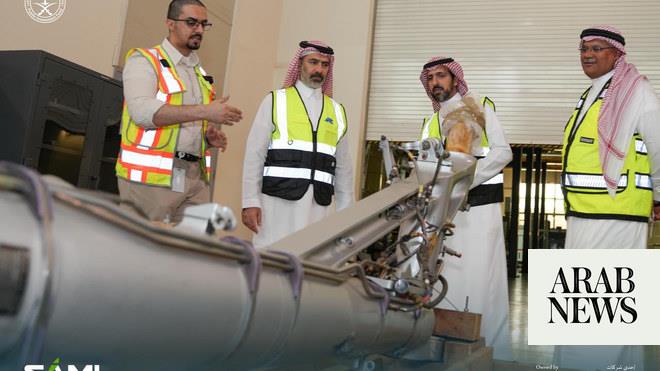
Engineering firms in the Kingdom are now required to hire at least 25 percent of their staff from the local population
Recruiters say the new policy makes a holistic approach to training, incentives and career progression imperative
DUBAI: Behind Saudi Arabia’s showpieces of infrastructure, towering skyscrapers and ambitious giga-projects is an army of highly skilled engineers who deal with the nuts and bolts, as it were, of the Kingdom’s Vision 2030 transformation.
Many of the engineering jobs since the start of the oil boom have been held by expatriates, who came to Saudi Arabia to make a good living on the strength of technical knowledge and skills picked up in their home countries and experience gained while working on engineering projects there.
To ensure that the Kingdom’s transformation is authentically Saudi as well as to create attractive job opportunities for nationals, the Ministry of Human Resources and Social Development announced last month a 25 percent quota for nationals in engineering professions.
The policy is targeted at private-sector firms that employ five or more engineers. The move will therefore have the added bonus of growing the Kingdom’s private sector, in turn helping to diversify the economy away from reliance on hydrocarbons.
According to the Saudi Council of Engineers, there are currently 448,528 engineers, technicians and specialists working in the Kingdom, with Saudis making up 34.17 percent of this number.
The number of jobs and the proportion of them held by Saudi nationals are projected to grow, with measures aimed at generating more than 8,000 engineering roles and an additional 8,000 positions in technical engineering fields.
Marwa Murad, managing director and founder of Maximiliano Development Management Services, believes the Kingdom can boost the localization of its technical workforce while maintaining economic stability and growth by implementing several strategies.
Establishing comprehensive training and development programs tailored to the specific needs of the engineering and tech sectors was essential, she told Arab News.
“By investing in vocational training and higher education partnerships with universities, the government can equip Saudi citizens with the necessary skills and knowledge to excel in engineering roles,” Murad said.
Encouraging partnerships between educational institutions and private sector companies is another strategy. Such programs can create an ecosystem that supports practical training and enhances internship opportunities for students.
Additionally, said Murad: “These collaborations can ensure that graduates are job-ready and familiar with the demands of the engineering field.”
Ali Nasir, managing director and partner at recruitment agency GRG, believes investment in science, technology, engineering and mathematics programs — known collectively as STEM — is another effective approach to boosting Saudization in the field.
“This includes significant investments in top-tier educational programs, providing scholarships and financial assistance, and facilitating mentorship and internship opportunities for the youth,” Nasir told Arab News.
Nasir also believes that cultivating a culture of entrepreneurship within the tech sector is desirable in order to encourage young Saudis to start their own tech ventures, which in turn will boost the private sector and promote organic job creation.
“This not only highlights the potential of STEM fields but also significantly contributes to advancing the nation’s economic development,” he said.
Along with educational partnerships, Murad says more needs to be done to address the lack of women in the Saudi engineering sector — a field traditionally dominated by men.
Promoting gender inclusivity in engineering can significantly broaden the talent pool, she said: “Initiatives that support women in engineering, such as mentorship programs and flexible working conditions, can help increase female participation in the workforce.”
Currently, women represent just 3.19 percent of the total number of Saudi engineers and technicians in the sector, while men make up the remaining 96.81 percent.
To address this imbalance, an initiative launched in April aims to increase the number of women in engineering by providing female Saudi engineers with training under the supervision of Aviation Australia and the International Aviation Technical College at Riyadh Airport.
This followed a memorandum of understanding signed in August between the Kingdom’s newest national carrier, Riyadh Air, and the Colleges of Excellence — an institution established by the Vocational Training Corp. in Saudi Arabia to nurture local talent.
The program, which represents the first of many collaborations, includes Saudi high-school graduates with impressive GPAs selected from thousands of applicants.
To actively improve diversity and inclusion in the sector, Riyadh Air’s first intake of trainee engineers from the apprenticeship program was made up entirely of women.
“Campaigns highlighting success stories, benefits of engineering professions and available support programs can stimulate interest among the youth,” said Murad.
Reflecting on progress in the Saudi engineering sector, Nasir from GRG said the profession had become an increasingly popular career path among Saudi men and women over the past 20 years, thanks in part to several state initiatives.
“The government proactively carries out career fairs, spotlights successful Saudi engineers as role models, and is building up a supportive environment for engineering startups,” he said.
Among the key initiatives introduced by the government is the Nitaqat Program, which categorizes companies based on the proportion of Saudis on their payroll. Those that score highly are offered benefits such as easier access to work permits for expatriates and eligibility for government contracts.
Additionally, the Human Resources Development Fund provides financial incentives for companies that implement training programs for Saudi nationals. The government also boosts programs tailored to generate job opportunities in high-demand sectors, facilitating effective job matching for Saudi citizens.
“It’s all about making engineering a go-to choice for the youth, while offering support and showcasing the benefits,” said Nasir.
Murad believes more can be done to move beyond simply enforcing Saudi quotas for companies and instead inspire locals to pursue STEM fields and recognize the opportunities offered by a career in engineering.
This includes initiating national campaigns to shift cultural perceptions about engineering. Moreover, she said, educational reforms should focus on experiential learning and critical thinking to make STEM subjects more engaging.
Currently, companies that achieve or surpass Saudization targets may receive tax benefits and reduced government service fees, helping to mitigate hiring costs. Similarly, initiatives to assist small and medium-sized enterprises include access to funding and mentorship.
“Supportive policies and incentives for companies investing in talent development, rather than just meeting quotas, can foster a more effective approach to Saudization,” said Murad.
Localization quotas have had mixed results across various Gulf countries. In nations like the UAE and Qatar, the policy has successfully increased the employment of local talent engineering.
These countries have effectively implemented initiatives to develop national skills through targeted training programs and educational reforms.
“As a result, there is a growing presence of skilled local professionals in industries that were traditionally reliant on expatriate workers,” Murad said.
However, these have not been without their challenges. “Some Gulf countries experienced an initial rise in local employment figures, but the retention of these employees remained a concern,” she said.
Contributory factors include the competitive job market, salary disparities, and the preference for expatriates who may have more practical experience in specific roles.
This has led some local professionals to seek opportunities abroad or in sectors that offer better compensation and career growth, she added.
Echoing Murad’s views, Nasir also believes quotas alone may not be enough to ensure sustainable workforce localization. He referred to Oman’s Omanization program as one that has seen moderate success, particularly in banking.
Likewise in Bahrain, Bahrainization has notably improved local employment, especially in engineering. Meanwhile, Kuwait’s Kuwaitization efforts have been less effective, with the private sector still largely dependent on foreign workers.
To ensure positive outcomes for Saudization, Murad believes crucial lessons can be drawn from the experiences of other Gulf countries.
She feels the effectiveness of localization quotas hinges on several factors, including the alignment of educational programs with market needs, the availability of mentorship and career development opportunities, and a shift in workplace culture toward inclusivity.
“Emphasizing continuous professional development and creating clear career pathways can enhance the long-term success of localization efforts,” she said.
“While localization quotas can drive significant progress in employing local talent, their effectiveness depends on a holistic strategy that addresses market realities, supports continuous learning, and enhances the overall appeal of career opportunities in STEM fields for Saudi nationals.”












